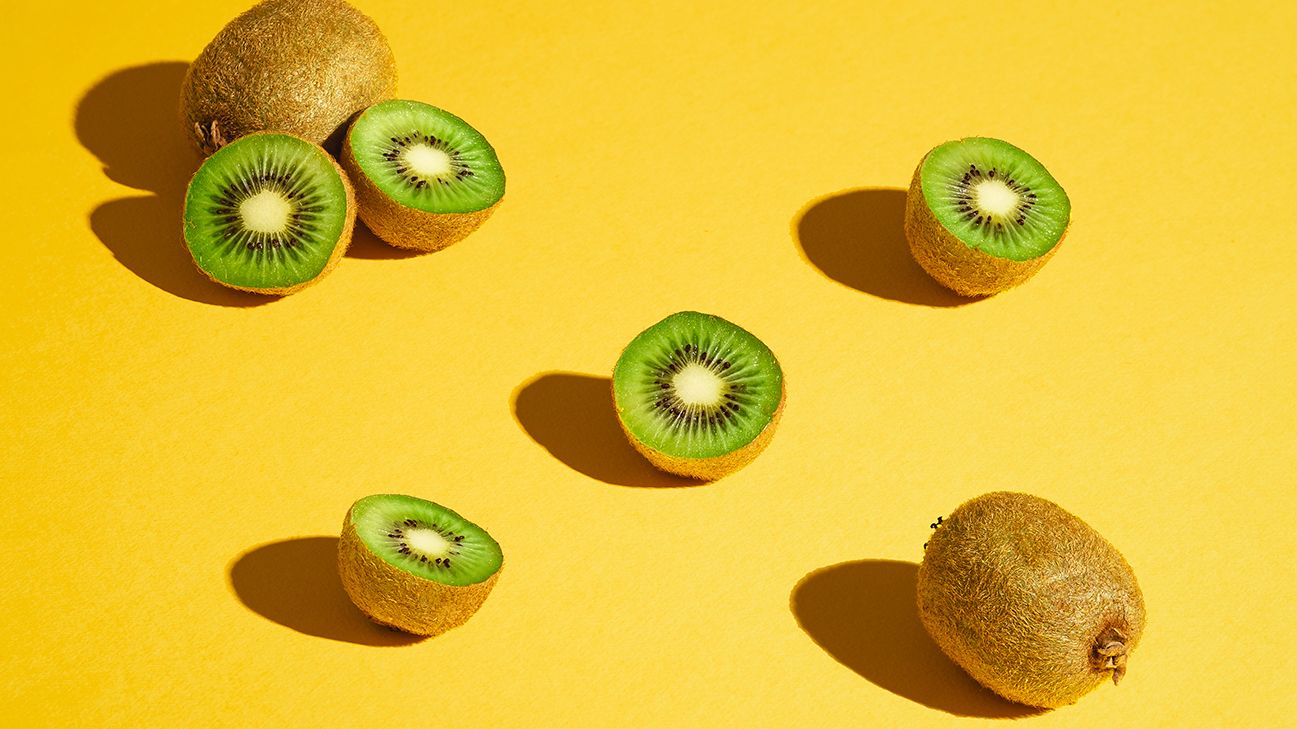Kiwi, aka kiwifruit, may be small in size, but it’s huge in benefits. Packed with vitamins and minerals, kiwi is one of the most nutritionally dense fruits out there.
Kiwi actually originated in China, but now it’s grown in New Zealand from June to October, and in California for the rest of the year. Although kiwi wasn’t available in North America until the 1960s, nowadays you’re likely to often find it at your supermarket or farmers’ market.
Here are some compelling reasons why you should consider making this little fuzzy fruit a regular part of your diet.

Forget Flintstones chewables — kiwis are filled with essential vitamins, too!
One kiwi (69 grams) packs 71 percent of your daily recommended vitamin C, which is important for the growth and repair of tissues in every part of your body. (One orange, in comparison, contains 80 percent of daily recommended vitamin C.)
These little guys have got minerals covered, too. Kiwis offer a variety of nutrients, including calcium, iron, magnesium, phosphorous, copper, and manganese.
And get this — one kiwi provides 215 micrograms of potassium (one banana has 375 micrograms) and without quite as much sugar and calories to boot.
Here’s the skinny: Kiwis are great for those trying to diet or lose weight, with only 42 calories in one fruit. They’re also very low in fat.
And they may taste sweet, but they only have about 6 grams of sugar in one medium fruit — half the amount in one red delicious apple.
One kiwi also contains 2.1 grams of dietary fiber to help promote feelings of fullness.
That fiber in kiwis may improve your bowel function and help prevent constipation.
The green part of the fruit has soluble fiber, while the seeds and skin — which are edible! — offer the insoluble kind.
Unlike soluble fibers, insoluble ones don’t dissolve in water, and are considered very gut-healthy because they add bulk to your diet and have a diuretic effect.
Eating 2 to 3 kiwis a day can help lower blood triglyceride levels by up to 15 percent, according to an older 2004 study.
More recently, the American Heart Association noted in a 2021 report that even slightly elevated levels of fatty deposits like triglyceride in your blood can lead to cardiovascular disease.
This suggests that eating a couple of kiwis a day could potentially help keep heart disease away.
One kiwi provides 23 percent of the recommended daily intake of vitamin K, a nutrient often missing from people’s diets.
Vitamin K is essential for bodily functions like normal blood clotting. This is important because it helps reduce your risk of excessive bleeding if you injure a blood vessel.
Not only does the mighty little kiwi help promote blood clotting, but it also contains substances that can lower your blood pressure.
Eating three kiwis a day may lower your blood pressure more than eating one apple, according to a 2014 study.
Lower blood pressure means a lower risk for serious issues like strokes or heart attacks.
Eating kiwi may help treat asthma and improve the function of your lungs.
A 2000 study of over 18,000 children in Italy found that those who regularly ate fruits rich in vitamin C, including kiwi, had improved protection against wheezing and other respiratory symptoms.
Vitamin C may also help you pant a little less after exercising, according to a 2014 review. It helps reduce exercise-induced bronchoconstriction (EIB), the narrowing of your airways after vigorous physical activity.
At the grocery store, look for kiwi that is plump and fragrant, with a slightly firm feel.
Most people prefer eating peeled kiwi, but remember that the skin is edible (and contains extra fiber, too!). Just wash the skin and rub it gently to minimize the brown fuzz before eating.
And while the phrase “slooping the kiwi” may sound a little, well, kinky, it’s actually just a method of slicing and scooping this green fruit: Slice the kiwi in half and then use a spoon to scoop out the delicious meat.
Ripe kiwi will keep for up to 4 weeks in your fridge. You can store kiwis that haven’t yet ripened in a plastic bag in your fridge for up to 6 weeks.
Bonus recipe: Greek yogurt and kiwi parfait
What you’ll need:
- 1/2 cup plain Greek yogurt
- 1–2 drops vanilla extract
- 1/2 teaspoon honey
- 1 kiwi, sliced
What to do:
- In a small bowl, combine vanilla extract and yogurt. Mix until well blended.
- In a glass, layer yogurt mixture, honey, and kiwi slices.
- Enjoy! For some extra crunch, top with homemade granola or slivered almonds.

